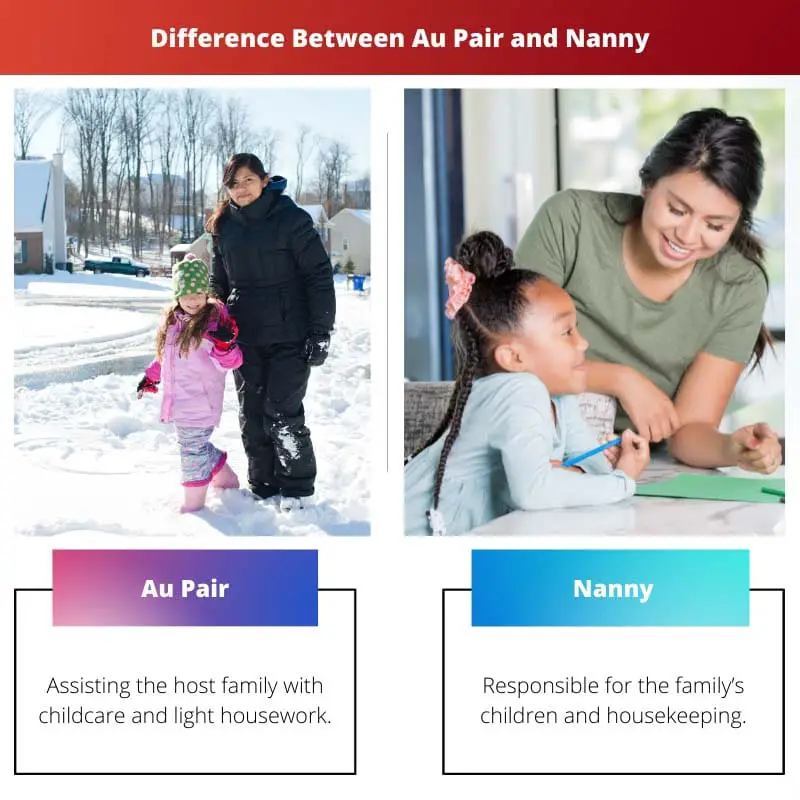Both nannies and au pairs assist families with childcare. A nanny is a regular employee who receives a wage.
An au pair is integrated into family life as a temporary family member. The au pair lives in the family’s home, eats meals with them, and is paid with monthly allowances rather than a wage.
Key Takeaways
- Au pairs are young foreigners who provide childcare in exchange for room, board, and cultural exchange, while nannies are professional caregivers who receive a salary.
- Au pairs work up to 45 hours a week and stay for one year, whereas nannies have more varied schedules and long-term commitments.
- Nannies have more childcare experience and training compared to au pairs.
Au Pair vs Nanny
An Au Pair is a young foreign person (ages of 18 to 30) who lives with a host family in a foreign country and provides childcare services in exchange for room, board, and a stipend. A nanny is a professional caregiver who provides full-time or part-time childcare services in a family’s home.

During the au pair’s temporary stay, the au pair is treated as a complete member of the family. As a result, he or she assists the family with childcare and may be requested to help with light housework.
In exchange for free board and housing, as well as allowances which the host family offers. The au pair is neither a housekeeper nor a nanny.
Au pairs are single women who have no children of their own.
A nanny is a childcare specialist who works in a family’s home. A family hires a nanny to offer the greatest degree of specialized child care and attention to the children of the household.
A nanny might work full-time or part-time for long or short periods and may or may not reside with the family. The nanny’s job is to help the family by being a caring, nurturing, and dependable companion to the children.
Comparison Table
| Parameters of Comparison | Au Pair | Nanny |
|---|---|---|
| Age | Between 18 and 30. | No age limitations. |
| Work responsibility | Assisting the host family with childcare and light housework. | Responsible for the family’s children and housekeeping. |
| Work permit | A particular au-pair visa is required but some nations do not require a visa. | Need a work permit or a visa |
| Working hours | Established by the host nation and mentioned in the contract. | Determined by the country’s labor regulations and are agreed with the family. |
| Salary | Receives monthly or weekly allowance. | Earns at least the country’s minimum salary. |
What is Au Pair?
Au pair is more than simply a fancy French term meaning “nanny.” The phrase translates to “on par with” or “equal to” and refers to a foreign national who is regarded as a member of his or her host family rather than merely an employee.
Consider an au pair to be a foreign exchange student who will remain with a host family in the United States for at least a year to earn money while attending school.
According to the US Department of State’s Bureau of Educational and Cultural Affairs, Au pairs must earn at least six hours of academic credit at an eligible US post-secondary educational institution while living with the host family.
They will also be thoroughly verified and interviewed by an organizational representative from a Bureau of Educational and Cultural Affairs-approved sponsor.
Au pairs are also subject to additional constraints when it comes to caring for babies under the age of two. An au pair, for example, cannot be placed with the host family until their child is at least three months old.
They are also not permitted to work with children under the age of two unless they have 200 hours of verifiable infant care experience.
If the host family has a special-needs kid, the au pair cannot be placed with them unless he or she has prior experience, abilities, or training in the care of special-needs children and the family has approved such training in writing.
What is Nanny?
A nanny is a child-care professional at least 18 years old who is employed by a family to give expert care and individual attention to the children.
The nanny can work full-time or part-time, care for babies, assist youngsters in developing good sleep routines, and attend to the children’s fundamental requirements and social trips
according to the agreed-upon preferences, depending on the family’s needs.
A nanny’s specialities, certificates, substantial experience, and/or a college degree in early childhood education are all commonly required.
Nannies should have a great passion for children and a desire to see the children in their care develop and prosper in a safe and supportive environment.
Cleaning the children’s rooms, washing their clothes, amusing them, disciplining them, teaching them etiquette, and caring for them when they are sick or angry are all things that a nanny is supposed to do.
A nanny collaborates with parents to help develop children who are responsible and capable.
Instead of just babysitting their children, some parents engage nannies who are qualified to instruct them, providing them with greater learning possibilities.
A competent nanny’s ultimate objective is to offer outstanding care to the children while they are in their care. A full-time professional nanny comes from a more sophisticated educational background.
This might be a mix of years of experience, a master’s degree in early childhood education, or a teaching credential.
They have specialized training in working with special needs children and various parenting styles and age groups. They have put time and effort into developing a background in child care.

Main Differences Between Au Pair and Nanny
- Au pairs are between the ages of 18 and 30, whereas nannies have no age limitations.
- Au pairs primarily assist the host family with childcare and light housework, whereas nannies are responsible for the family’s children and housekeeping.
- There is a particular au-pair visa in various countries. Some nations do not require a visa, however, Nannies who want to work abroad need a work permit or a visa. The majority of nannies work in their nation.
- The maximum working hours of an au pair are established by the host nation and should be specified in a contract, but the working hours of a nanny are determined by the country’s labour regulations and are agreed upon with the family.
- The family pays the au pair and receives a monthly/weekly allowance from the host family, whereas the family pays the nanny and earns at least the country’s minimum salary.


It is very important to invest in childcare programs that can ensure the well-being of the children, and also protect and support people who work in this sector, such as nannies and au pairs.
This was an interesting read. It’s good to have a clear understanding of the difference between the two. It’s important to make the right choice for your family’s needs.
The information offered here is really helpful. It’s always best to fully understand these terms before making any important decisions.
Very informative, It is a detailed and comprehensive explanation of the different caregiver roles. I think we should change the legislation to protect these young people better in every country.
I think there should be regulations that require au pairs to have some experience in child care or related fields.
This piece offers a great deal of insight into the different roles. It’s a thorough examination of the responsibilities of au pairs and nannies.
The provided comparison is excellent for families trying to decide between hiring an au pair or a nanny. The detailed analysis of their duties is a solid base to make informed choices.
This article provided a good comparison, but it would have been nice to see more information about the legal requirements for hiring an au pair or nanny.
The post offers a very clear comparison of the two roles. It’s a good starting point for anyone who might be considering hiring help with childcare.
I think this post is very exhaustive but ends up sounding repetitive. More conciseness would be good. Also, it could benefit from more in-depth analysis of the legal differences.
I appreciate how this text offers a crystal clear distinction between a nanny and an au pair, something that is often overlooked.
The comparison table is very helpful to understand the key differences. However, it would be good to know the source of this information.